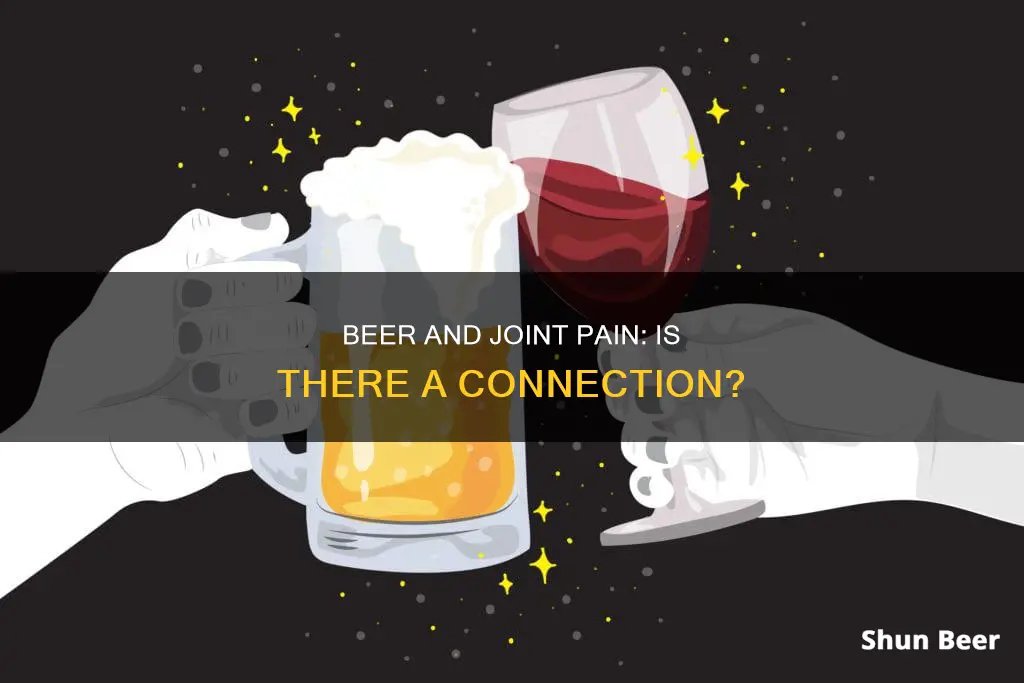
Drinking alcohol is a common pleasure for many, but did you know that it could be linked to joint pain? While an occasional drink is unlikely to cause lasting harm, regular or excessive alcohol intake can lead to uncomfortable symptoms, including aches and pains in various joints. This is especially true for those already suffering from inflammatory joint diseases such as rheumatoid arthritis. So, how exactly does drinking beer or other alcoholic beverages contribute to joint pain?
| Characteristics | Values |
|---|---|
| Dehydration | Alcohol is a diuretic, which increases urine production and the risk of dehydration. Dehydration dries out the body's tissues and joints, increasing friction between joints and causing discomfort. |
| Inflammation | Alcohol boosts the inflammatory response in the body. Excessive inflammation can lead to severe joint pain, especially for those with inflammatory joint diseases like rheumatoid arthritis. |
| Uric Acid Levels | Alcohol, especially beer and spirits, increases uric acid levels in the blood. High uric acid levels can form urate crystals in the joints, causing gout and severe pain. |
| Nutrient Absorption | Alcohol interferes with the absorption of essential nutrients like vitamin D and calcium, vital for bone health. Deficiency in these nutrients weakens bones and joints, increasing the risk of pain and injuries. |
| Peripheral Nerve Damage | Continued alcohol consumption can lead to alcoholic neuropathy, causing nerve pain in the hands, feet, and joints. |
| Sleep Disturbance | Alcohol disrupts sleep quality, affecting the body's restorative functions and potentially leading to joint pain and body aches. |
| Medication Interactions | Alcohol interacts with arthritis medications, increasing the risk of liver damage and gastrointestinal issues. |
| Gut Health | Alcohol negatively impacts the gut's ability to absorb and process nutrients, contributing to colorectal cancer risk and potentially worsening arthritis symptoms. |
| Gout | Alcohol consumption, particularly beer and spirits, can trigger gout-related joint pain due to increased uric acid levels. |
What You'll Learn

Beer drinking is linked to higher risks of knee and hip osteoarthritis
Beer drinking has been linked to a higher risk of knee and hip osteoarthritis, a painful condition affecting millions of people. While the exact mechanism is still being studied, several factors related to alcohol consumption are believed to contribute to this increased risk.
Inflammation
Beer consumption, especially in excessive amounts, can boost the body's inflammatory response. While inflammation is a natural part of the healing process, too much inflammation can lead to severe joint pain, especially in individuals already suffering from inflammatory joint diseases like rheumatoid arthritis. The immune-altering properties of alcohol can exacerbate these inflammations and worsen symptoms.
Dehydration
Alcohol is a diuretic, which means it increases urine production and, consequently, the risk of dehydration. Dehydration not only dries out the body's tissues but also reduces lubrication in the joints. This lack of lubrication increases friction between the joints, causing discomfort and exacerbating pain, especially in weight-bearing joints like the knees and hips.
Uric Acid Levels
Beer drinking can increase uric acid levels in the blood. High uric acid levels can lead to the formation of urate crystals in the joints, a key factor in gout, a type of arthritis. Gout results in severe pain and swelling, primarily affecting the big toe but also impacting other joints, including the knees and hips.
Nutrient Absorption
Alcohol interferes with the body's ability to absorb essential nutrients critical for maintaining healthy joints. For example, it can affect the absorption of vitamin D and calcium, both vital for bone health. Deficiency in these nutrients can lead to weakened bones and joints, increasing the risk of pain and injuries.
Peripheral Nerve Damage
Continued alcohol consumption can cause alcohol-related neuralgia or nerve pain. The high blood alcohol content affects the protective sheathing of nerve cells, and signs of alcoholic neuropathy often begin in the extremities, such as the hands, feet, and joints.
Medication Interactions
For individuals taking medication for arthritis, drinking beer can lead to adverse interactions. Beer, when combined with certain medications, can increase the risk of stomach ulcers and liver damage. It is crucial to consult a doctor or healthcare professional to understand how alcohol may interact with specific medications.
Managing Beer Consumption with Type 1 Diabetes
You may want to see also

Alcohol can dehydrate the body, reducing joint lubrication
Alcohol is a diuretic, which means it leads to increased urine production and, consequently, a higher risk of dehydration. Dehydration not only dries out the body's tissues but also reduces lubrication in the joints. This lack of lubrication increases friction between the joints, which can cause discomfort and exacerbate pain, particularly in weight-bearing joints like the knees or hips.
The spine, being central to the body's structure, is especially vulnerable to the effects of dehydration and the inflammatory effects of alcohol. This can lead to stiffness and pain in the lower back, which might be experienced after periods of heavy drinking.
Keeping well-hydrated is essential, especially when consuming alcohol. It is recommended to drink water before, during, and after drinking alcohol to help offset its dehydrating effects and keep joints well lubricated.
Reducing the amount of alcohol you drink is a straightforward way to alleviate joint pain. Adhering to the guidelines for moderate drinking—up to one drink per day for women and two for men—significantly reduces the risk of developing joint pain.
In addition to dehydration, alcohol can also cause inflammation, which can lead to severe joint pain, particularly for those already suffering from inflammatory joint diseases such as rheumatoid arthritis. Alcohol's ability to alter immune function can exacerbate these inflammations and worsen symptoms.
Maryland's Beer Laws: 18-Year-Olds and Alcohol
You may want to see also

Alcohol can cause sleep disruptions, leading to joint pain
Alcohol can cause disruptions to sleep, which can, in turn, lead to joint pain. While drinking alcohol may make you feel sleepy, it interferes with your sleep quality. Alcohol makes it more difficult to get REM sleep, which is the restorative period of rest. Fatigue can lead to joint pain, as well as other body aches.
Alcohol can also cause peripheral nerve damage, which can lead to joint pain. The high BAC (blood alcohol content) from drinking affects the protective sheathing of your nerve cells. Signs of alcoholic neuropathy usually begin in the extremities, such as the hands, feet, and joints.
Additionally, alcohol consumption can negatively impact chronic health conditions such as arthritis, rheumatoid arthritis, and gout. This is partly due to alcohol's interactions with common rheumatoid medications and its effects on the body's uric acid levels, which can increase gout symptoms.
Alcohol also has a dehydrating effect on the body, as it is a diuretic, increasing urine production and the risk of dehydration. Dehydration dries out the body's tissues and reduces lubrication in the joints, increasing friction and discomfort, especially in weight-bearing joints like the knees and hips.
Finally, alcohol can interfere with nutrient absorption, hindering the body's ability to absorb essential vitamins and minerals critical for maintaining healthy joints, such as vitamin D and calcium. Deficiencies in these nutrients can lead to weakened bones and joints, increasing the risk of pain and injuries.
Actors Drinking Alcohol in Commercials: Is It Allowed?
You may want to see also

Alcohol can trigger gout attacks by increasing uric acid levels
Alcohol consumption, especially in large quantities, can have several negative effects on the body, including joint pain. While there is little evidence directly linking alcohol to worsening arthritis symptoms, it can be linked to other health conditions that make people more susceptible to joint pain. One of these conditions is gout, which is caused by a buildup of uric acid in the joints. Alcohol consumption, especially beer and spirits, can increase uric acid levels in the blood, leading to the formation of urate crystals in the joints. This is a key factor in triggering gout attacks.
Gout is an extremely painful form of arthritis that usually affects the big toe but can impact other joints as well. It is caused by elevated levels of uric acid in the blood, which can be influenced by alcohol consumption. Uric acid is produced when the body breaks down purines, which are found in high quantities in certain foods and drinks, including beer. When uric acid levels become too high, needle-like urate crystals can form in the joints, causing severe pain and swelling.
Alcohol consumption can significantly increase the risk of gout attacks by raising uric acid levels in the body. Beer, in particular, has been associated with higher risks of gout due to its purine content. Even moderate drinking can increase the risk of gout recurrence by 41%. Therefore, individuals diagnosed with gout are typically advised to refrain from consuming alcohol, including wine, beer, and liquor, to prevent triggering gout attacks.
In addition to triggering gout attacks, elevated uric acid levels can also contribute to joint pain in other ways. Uric acid crystals can cause joint inflammation, which is a common cause of joint pain. Inflammation is a natural part of the body's healing process, but excessive inflammation can lead to severe joint pain, especially for those already suffering from inflammatory joint diseases such as rheumatoid arthritis. Alcohol's ability to boost the body's inflammatory response and alter immune function can exacerbate these inflammations and worsen joint pain.
Furthermore, alcohol consumption can also contribute to dehydration, which can indirectly affect joint pain. Alcohol is a diuretic, which means it increases urine production and consequently leads to dehydration. Dehydration reduces lubrication in the joints, increasing friction and discomfort, especially in weight-bearing joints like the knees and hips. Therefore, staying hydrated, especially when consuming alcohol, is crucial for maintaining joint health and reducing the risk of alcohol-induced joint pain.
Near Beer After Neuropathy: Is It Safe?
You may want to see also

Alcohol can interfere with arthritis medication
Alcohol can have both positive and negative effects on arthritis. While moderate drinking may reduce the risk of developing arthritis, excessive drinking can trigger flare-ups of gout, a form of arthritis caused by the buildup of uric acid in the joints.
Alcohol can also interfere with arthritis medication, with serious health implications. For example, drinking alcohol with non-steroidal anti-inflammatory drugs (NSAIDs) such as ibuprofen (Motrin) or naproxen (Aleve) can increase the risk of stomach bleeding and ulcers. Alcohol can also increase the risk of liver damage when taken with acetaminophen (Tylenol) and methotrexate (Rheumatrex, Trexall, Otrexup, or Rasuvo).
The American College of Rheumatology advises people taking methotrexate to abstain from alcohol due to the risk of liver poisoning and liver damage. However, a 2017 analysis published in the Annals of Rheumatic Diseases reported that moderate drinking (no more than 14 standard drinks per week) may be acceptable for people taking methotrexate who do not have underlying liver problems.
It is important to speak with a doctor about the risks and benefits of drinking alcohol when taking arthritis medication. The amount deemed "safe" may vary depending on factors such as liver or kidney disease and a history of stomach ulcers.
Ginger Beer: Kid-Friendly Beverage or Not?
You may want to see also
Frequently asked questions
Yes, drinking beer can cause joint pain. Beer contains gluten, which can trigger gout-related joint pain. Beer can also increase the levels of uric acid in the blood, leading to the formation of urate crystals in the joints, which is a key factor in gout.
Beer is a diuretic, which means it leads to increased urine production and consequently a higher risk of dehydration. Dehydration reduces lubrication in the joints, increasing friction and discomfort.
Yes, drinking beer can also interfere with nutrient absorption, affecting the body's ability to absorb vitamin D and calcium, which are vital for bone health. Beer is also associated with weight gain, which can put extra pressure on weight-bearing joints.
Some studies have linked moderate alcohol consumption to improved heart health and reduced risk of joint pain, especially rheumatic joint pain. Beer may also have a positive effect on an individual's inflammation.
If you experience joint pain after drinking beer, it is important to hydrate and make sure you are getting enough water. Reducing your alcohol intake and consulting a healthcare professional may also be beneficial.







